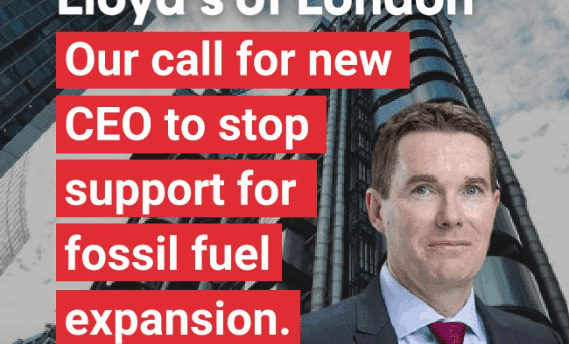In making Scope 3 emissions reporting optional, the PCAF-NZIA protocol violates Race to Zero and UNHLEG recommendations
London – Today the Platform for Carbon Accounting Financials (PCAF) and the Net-Zero Insurance Alliance (NZIA) published their long-awaited Greenhouse Gas Accounting and Reporting Standard for the insurance industry.
Under the minimum criteria of the UN Race to Zero campaign, NZIA members must set targets reflecting “a fair share of the 50% global reduction in CO2 by 2030… Including scopes 1, 2 and 3 for businesses and… for financial entities, including all portfolio /financed /facilitated/ insured emissions”. The new protocol was supposed to define how insurers will reach this aim by setting the standard for how they measure and disclose insured emissions.
"The PCAF protocol opens the door for greenwashing and will allow insurers to continue business as usual in underwriting the expansion of the oil and gas industry.”
Firstly, it only makes insurers responsible for a small proportion of their customers’ emission, proposing that emissions be attributed to insurers in proportion with the company’s insurance premiums’ share of total revenue. If a company has an annual revenue of $100 million and its insurance premiums amount to $1 million, insurers would take responsibility for just 1% of the company’s emissions, even if the company couldn’t operate without its cover.
But the protocol’s fatal flaw is its rejection of mandatory disclosure of the Scope 3 emissions of insurers’ customers. It says these emissions “should [but don’t have to] be included, when significant and where data will allow”. As a result, insurers will be able to decorate themselves with the PCAF seal of approval even if they only measure the operational emissions of the fossil fuel producers they insure and not the much larger emissions of the fossil fuels themselves.
The PCAF standard will form the basis of the Net Zero Insurance Alliance’s forthcoming target setting protocol, expected in January 2023, which will set the terms for how NZIA members reduce their emissions in line with their commitments. The draft protocol has already watered down the PCAF language further and only says that scope 3 emissions “may be included” in emissions reduction targets. If the final protocol includes this Scope 3 omission, this will violate both Race to Zero’s criteria as well as the recommendations of the UN’s High-Level Expert Group on Net Zero Emissions Commitments.
The UN recommendations state that: “A non-state actor should be considered and recognised as net zero aligned [when] its pledge and progress reporting cover all scope emissions and all operations along its value chain in all jurisdictions (any omission needs to be properly reported).”
At the launch of the recommendations, UN Secretary General Antonio Guterres said, “By the first half of 2023, all existing net-zero voluntary initiatives must explain how they will align and revise their standards accordingly,” adding that, “So-called ‘net-zero pledges’ that exclude core products and activities are poisoning our planet… The sham must end.”
Excluding core products and activities is precisely what the PCAF protocol does by omitting Scope 3 emissions. This is also inconsistent with evolving regulations such as the EU’s sustainable financial disclosure regulations (SDFR) and the US Security Exchange Commission’s climate disclosure proposal.
"Insurance companies can contribute importantly to halting climate change, e.g. by refusing to insure new oil and gas fields or by requiring climate standards for infrastructure and buildings. Yet, industry-led initiatives such as PCAF and NZIA are understating their responsibility undermining the credibility of these coalitions. It is time now for the coalitions to trim their membership to companies with science-based climate ambitions."
"The failure of PCAF and NZIA to come up with a credible insured emissions protocol confirms the conclusion of the UN Expert Group that voluntary initiatives and guidelines are insufficient. It’s time for regulators to step in and mandate credible emissions reporting and net zero targets that cover all sources of emissions.”



